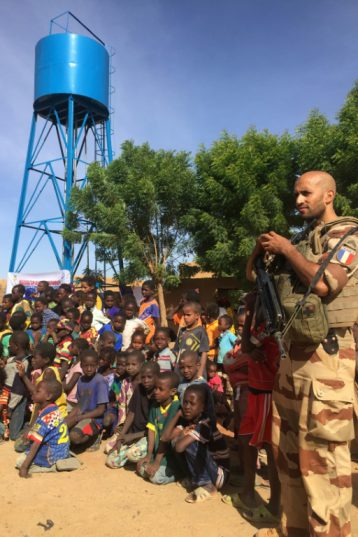Man City boost top five bid, Aston Villa thrash in-form Newcastle
It holds a vital resource of which they have been deprived for years: water.
In a world where more than a billion people lack access to water, residents of this dusty corner of Gao, the main city in Mali’s sprawling arid north, know the terrifying consequences of drought — and today is a time for celebration.
“Before, I had to walk three or four kilometres to go and get water with jerrycans. Sometimes I had to queue all day,” said Hawa Kante, a mother of six who had dressed up in a black and yellow turban, immaculate white blouse and gold jewellery for the inauguration of the well.
“I was obliged to take my little ones to help me carry the water, they were not able to go to school,” she said.
After years of French forces fighting a jihadist insurgency in the west African country’s north, building up infrastructure is part of a renewed focus to win over local hearts and minds — a campaign to help stabilisation.
The well was built by a local company and funded by France’s Barkhane mission — an anti-terror operation involving some 4,000 troops across the Sahel region, a vast stretch of territory on the edge of the Sahara Desert.
In this former French colony, French troops have not always been welcomed.
But today is a victory in the battle against grinding poverty and is something to celebrate. Swarms of children wave Malian flags, excitedly singing along to the beat of drums, as others dance and clap.
Nearby, other children sit on the sandy ground alongside a French soldier, his rifle slung over his shoulder, while other troops hand out mango juice and cakes to local people.
The well has six taps and an automatic pumping system that runs on solar energy, capable of drawing up water from 80 metres (262 feet) deep into a 10-cubic-metre (10,000-litre) tank.
It aims to transform the lives of 6,000 local residents, and some 25,000 people living in the surrounding area, who previously had to walk many kilometres to access a water source.
– The ‘situation was critical’ –
“In 2015, a two-year-old child died here due to the lack of water. It is what motivated us to act,” said Boureima Keita, a member of a group calling itself the Young Patriots.
“The water stocks were insufficient, the situation was critical,” Keita said, explaining that the population of Gao has grown again since jihadists were cleared from the city in 2013.

The well was funded by France’s Barkhane mission and built by a local company.
His group asked French troops to help tackle the water crisis, as supplies delivered by tanker trucks had failed to meet demand.
The Barkhane mission responded by offering 10,000 euros ($11,600) in financing.
“We have a common history with Mali, the relations between France and Mali are old, they did not start with Barkhane,” said French Colonel Arnaud Cervera, outlining other military initiatives to help local communities, including supplying medicine and computers for schools.
NGOs say irregular rainfall and political instability in Mali have left as many as four million people lacking safe water, with the centre and north of the landlocked country suffering from grave shortages.
More than 4,000 children die before the age of five every year due to diarrhoea caused by poor water and sanitation, according to charity WaterAid.
“Water is life, so today after the installation of this well, women go about their business and children go to school,” said Keita.
Download our app